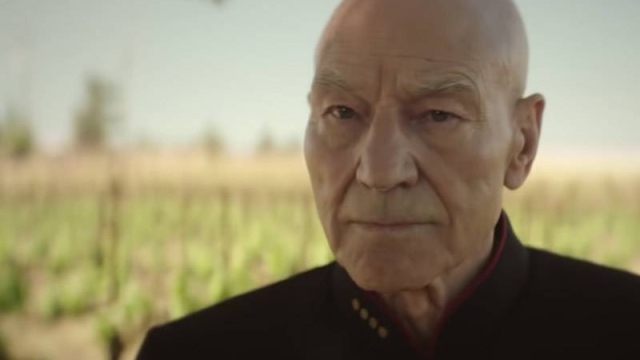Decades after the events of Star Trek: Nemesis, Jean-Luc Picard’s self-titled Star Trek spinoff series presents the former Enterprise captain as a man worn down by tragedy and darkness. It’s a tragedy that the man behind him, Sir Patrick Stewart, fought to include—if only for his own conviction about the state of our current world.
Speaking to Variety in an extensive new cover story in the run-up to Picard’s launch on CBS All Access in a few weeks, Stewart reiterated the uncertainty he felt returning to a character that flung him to international and beloved recognition as one of the foremost icons of science fiction. Having initially turned down offers to reprise the famed captain, Stewart ultimately agreed after seeing that the architects of what would become Star Trek: Picard had plans to do much more than just a selfsame follow-up to The Next Generation.
[referenced url=” thumb=” title=” excerpt=”]
He was vindicated by one of his own vehement beliefs about an older, wiser, battle-damaged Jean-Luc: the idealised future presented by the series should be left in the past. “I explained to them all those elements of Next Generation which belong in Next Generation, and why I didn’t want to go near them again,” Stewart told the trade. “But they talked about it in such an interesting way. And they talked for a long time.”
Stewart’s view may be surprising to some—that we cannot simply return to this bright, optimistic future of a unified humanity and its allies out among the stars. But for the actor, who has used his stature and recognition for decades to highlight social and political causes he holds deeply, just returning to that ideal felt inherently wrong.
“In a way, the world of Next Generation had been too perfect and too protected,” Stewart added. “It was the Enterprise. It was a safe world of respect and communication and care and, sometimes, fun. [Picard] was me responding to the world of Brexit and Trump and feeling, ‘Why hasn’t the Federation changed? Why hasn’t Starfleet changed?’ Maybe they’re not as reliable and trustworthy as we all thought.”
There’s something tragic in Stewart’s acceptance that, in the lens of the world we live in, there’d be a naiveté in presenting Picard with the same utopian optimism that fuelled The Next Generation. But engaging with the darkness of a world that tests and emboldens those higher ideals is something Star Trek has done to incredible effect time and time again. Doing so once more in a time that truly needs that sort of thinking remains a bold thing indeed.
[referenced url=” thumb=” title=” excerpt=”]
